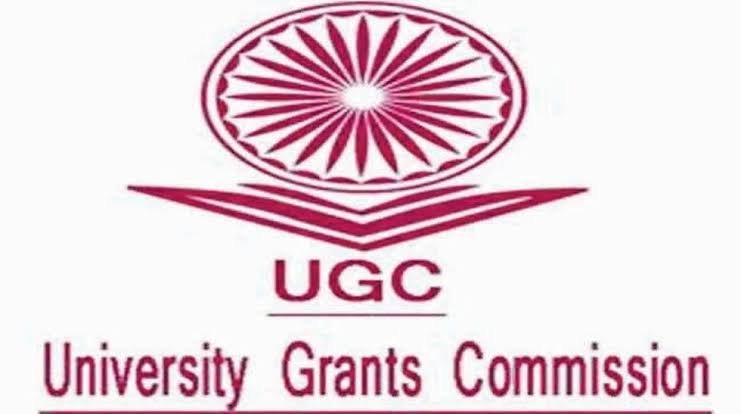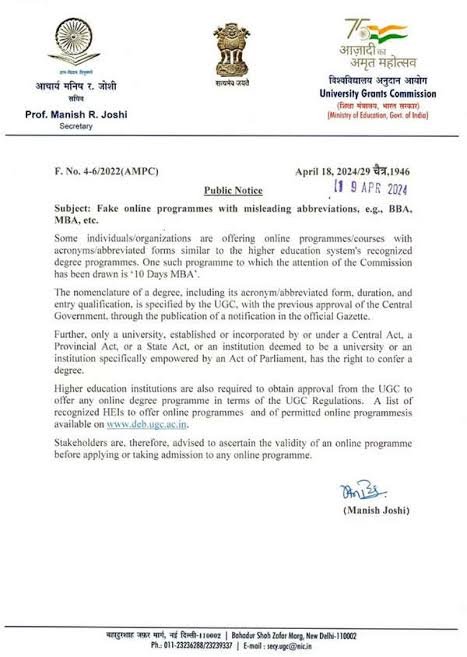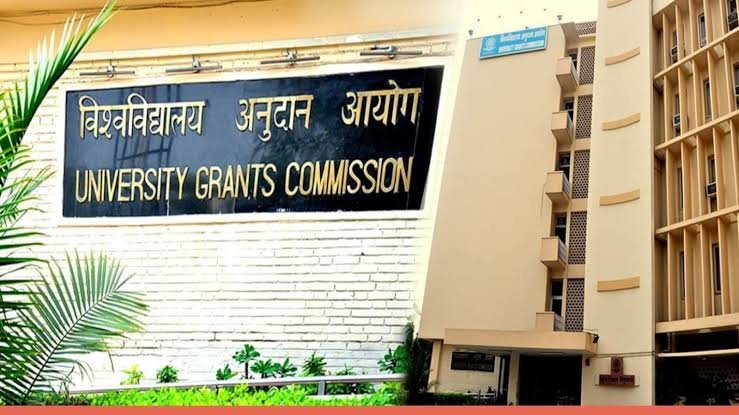UGC issues warning against fake online degrees

The University Grants Commission (UGC) has issued a warning over fraudulent online degrees. They have stated that only institutions recognized by central, provincial, or state acts, considered universities, and universities empowered by the Parliament Act have the ability to bestow these degrees. The UGC has also warned against persons and companies advertising online programs with acronyms that sound like recognized degree programs in higher education, such as the fraudulent “10-Day MBA” program. They encourage students to verify the legality of online programs before enrolling, and their website includes a list of recognized higher education institutions (HEIs) that offer approved online programs. Students must exercise caution and consult the UGC’s official resources to avoid falling victim to fraudulent schemes.
For more information follow official website of UGC.
How can students verify the legitimacy of an online degree?

Students can confirm the legitimacy of an online degree by doing the following steps:
- Check the Accreditation. Ensure that the institution providing the online degree is approved by a recognized accrediting agency. In India, this can be checked on the University Grants Commission (UGC) website.
- Verify with the National Academic Depository (NAD). The NAD enables the digital verification and validation of academic awards awarded by registered Higher Education Institutions (HEIs) in India.
- Research the University’s History: Examine the university’s history and track record of graduates, both on campus and online.
- Compare Degree Programs: Compare the online degree program to traditional, on-campus degree programs in the same topic to guarantee quality and consistencey.
- If in doubt, contact the university directly to learn more about the program and its legality.
- Employers and students can use verification services such as DirectVerify or Knowy to ensure the authenticity of their degrees.
- Look for red flags. Be wary of programs that offer degrees in a short period of time or at a considerably cheaper cost than the norm.
Remember, it is critical to conduct extensive research before enrolling in any online degree program to ensure that your time and money are effectively spent.
Are there any websites or tools that can aid with degree verification?

Yes, there are various websites and programs that can help you verify your online degree:
- iCredify provides a comprehensive education verification service, which includes degree certificate and mark card verification.
- World Education Services (WES) provides credential evaluations and degree equivalence tools, as well as a Digital Badge that may be promptly confirmed online.
- National Student Clearinghouse: Verifies enrollments and degrees 24 hours a day, seven days a week, and serves as a national repository for enrollment and degree information.
- DirectVerify and Knowy are databases that allow employers to do background checks and authenticate educational materials provided by potential hires or employees.
These service’s serve to confirm that the degrees claimed by individuals are legitimate and issued by approved universities. It is always a good idea to employ such verification services to avoid bogus academic claims.
What criteria are used by the UGC to give guidelines about the legitimacy of online degrees?
The University Grants Commission (UGC) has developed guidelines to help students detect and avoid fraudulent online degrees. These rules aim to ensure the legitimacy of online degree programs. Here are the main criteria:
1. Accreditation: Accreditation is essential. Students should ensure that the institution delivering the online degree is accredited by a trustworthy agency. Accreditation assures that the program meets specific quality and integrity requirements.
2. Thorough study: Before enrolling, students should perform extensive study on the institution and program. Check the institution’s website, check reviews, and confirm faculty credentials. This research contributes to the authenticity and quality of the online degree program.
3.Contact Information: Legitimate institutions provide explicit contact details. Search for a physical address, a phone number, and an email address. Vague or nonexistent contact information may indicate a fraudulent online degree program.
4.Transparency: Legitimate programs disclose full information about the curriculum, course requirements, tuition costs, and other pertinent information. Be skeptical of programs that promise quick and simple degrees without comprehensive course outlines.
5. Verification: Students can confirm the legitimacy of an online degree program by contacting accrediting agencies or appropriate government authorities. These organizations can determine whether the program is legitimate.
By adhering to these standards, students can protect themselves from frauds and ensure that their educational endeavors are legitimate and recognized by authorized schools. It is critical to use caution and due diligence when selecting online education options.
for more interesting update follow our official website.




